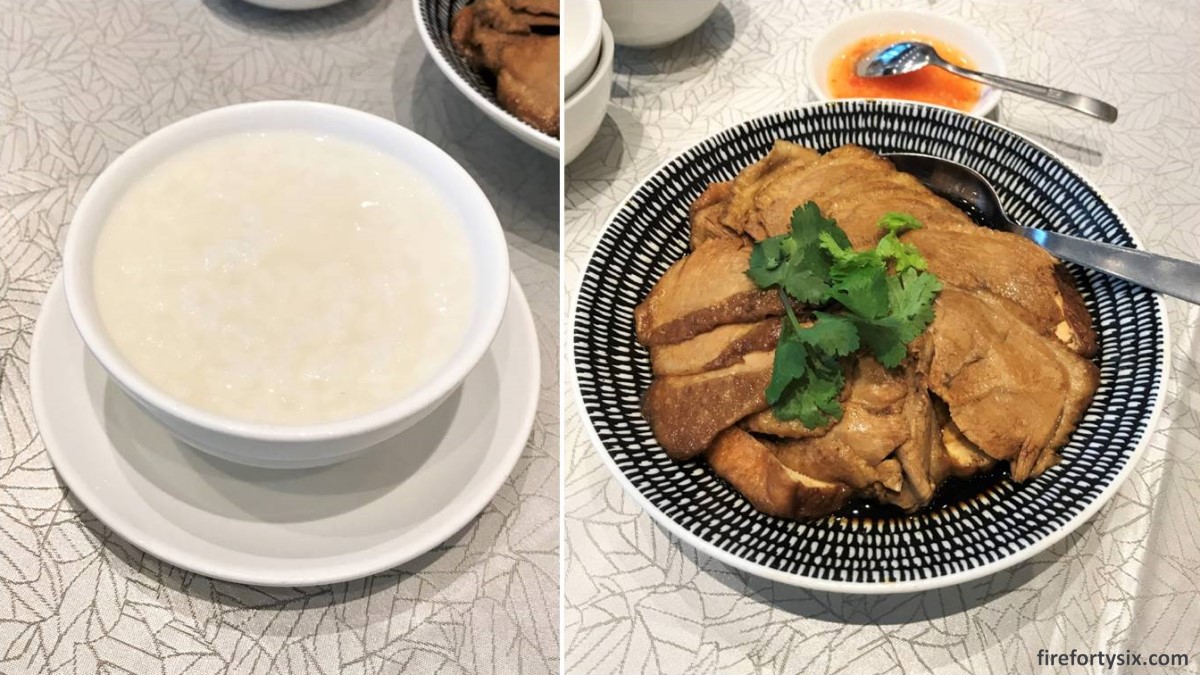The Old Folks haven’t had a nice meal outside for more than six months now and given the currently low infection numbers, we thought it’d be good to get them out for some fresh air.
It was a cold rainy day, perfect for some warm Teochew comfort food at Chui Huay Lim Teochew Cuisine, located within the Chui Huay Lim Club at 190 Keng Lee Road between Newton and Novena.


The first thing that catches your eye as you enter is the restaurant’s signboard and a miniature model of the building.



The second thing that you can’t help but notice is the safety protocol now common across most restaurants — SafeEntry QR code, temperature screening station and hand disinfectant dispenser; all of them contactless of course.


The third thing was a poster advertising their current promotion for live Boston lobsters, which looked very enticing and managed to convince us to splurge and enjoy life a bit during these fairly depressing times.

The layout of the main dining hall and the spacing between tables doesn’t seem to have changed from pre-pandemic days, a sign that they’ve maintained safe distancing even before it became mandatory.

The wine fridge at the back of the hall remains well-stocked, though the fish tanks with live seafood are now a bit empty and sad. They used to be teeming with various fish, prawns, lobsters and other seafood, but now only contain the bare minimum to meet reduced demand. Times are tough indeed for F&B.


Over the years, we’ve dined at Chui Huay Lim maybe a dozen times now and, for some strange reason, it’s rained most of the times that we’ve been there. Which is not a bad thing, because Teochew food is really nice when it’s cold outside.
The one thing that I never fail to order is a bowl of white porridge to go with a plate of classic braised duck and tau kwa. It’s simple but satisfying, especially on a rainy day. The key is a light but flavourful braising liquid and making sure that the duck is cooked just right, both of which Chui Huay Lim consistently does well.
The tau kwa plays a supporting role and probably there for cost reasons, but to me, it’s an integral part of the dish and equally important as the duck itself. The tart chilli vinegar dip helps to reset the taste buds in between bites and is a good accompanying condiment.


The other appetisers arrived as I was slowly enjoying my porridge, including the orh lua (oyster omelette) and kwa huay (deep fried liver rolls) that we always seem to order. The menu that day included a special dish of pan-fried kurobuta pork which turned out to be quite good, although I’d argue that it was more Cantonese-style than Teochew.



When we ordered the Boston lobster promotion, we were asked to choose how we wanted it cooked. Since the promotional poster featured it “wok baked with fermented bean and garlic Teochew style”, we went with that, because we’re susceptible to good marketing.
I expected it to be served in a large communal plate for sharing, but it arrived individually plated instead. The Old Folks seemed suitably impressed with the presentation, and remained happy as they extracted the sweet meat from the shell. It was good to see them enjoying the meal. Mission accomplished.

We ended the meal with a Teochew-style fried kway teow with diced kai lan and chye poh that was cooked with abundant wok hei, imparting a strong smoky taste. We were quite full by then, so we skipped dessert and just had the complimentary tea that was served to cleanse our palate, the same concentrated and slightly bitter tea served at the start of the meal.


Over the many years that we’ve dined at Chui Huay Lim, we’ve tried many of their dishes, especially the staple Teochew classics such as hay chok (deep-fried prawn rolls), ter kah dang (pig trotter terrine) and the previously mentioned braised duck and orh lua.



Plus other dishes that are probably not-so Teochew but equally good like their sweet-and-sour you tiao (which tastes very much like Cantonese sweet-and-sour pork), claypot crab tang hoon and an especially delicious stone pot braised fish with live soon hock, served bubbling hot.



They also offer a traditional dessert that is hardly found in Teochew restaurants nowadays because of the effort needed to make it properly — hwang swa orh, or sugar-encrusted deep-fried yam sticks. It tastes exactly like how it’s described, with the yam still maintaining an al-dente bite.
You’ll need to order it at least 15 minutes beforehand, so if you don’t want to wait too long, remember to place your order well before the meal ends. I remember once when we had to wait even longer, because the first batch wasn’t up to the chef’s standards, and he had to make it again.


Chui Huay Lim is also where we have many celebratory meals, including The Old Folks birthdays, because old people are stubborn traditional like that. During those occasions, we trot out the big guns like a whole roasted suckling pig, large steamed pomfrets and pretty peach-shaped longevity buns.



Among the different styles of Chinese cuisine in Singapore, Teochew restaurants seem to be less common and popular as Cantonese, Hokkien or Sichuan. The ingredients are simpler, the flavours are more subtle and the dishes are less elaborate.
Our go-to Teochew restaurant in the past used to be the old-school Lee Kui (Ah Hoi) Restaurant located along Mosque Street near Chinatown, but it unfortunately shut down in late 2015.
Over time, it’s inevitable that traditional Chinese restaurants will continue to give way to more modern international ones. So, it’s a good thing that large chains like Jumbo are able to create and sustain restaurants like Chui Huay Lim that keep Teochew traditions alive.
And perhaps more importantly, continue to offer my favourite rainy day meal of white porridge with braised duck and tau kwa.
